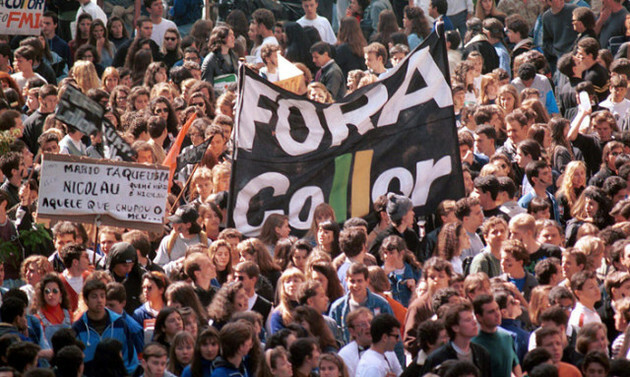O Collor Impeachment was the process of removal of President Fernando Collor de Mello, in 1992.
Accused of involvement in corruption and financial fraud, there was great agitation in the streets with the Caras Pintadas movement.
The Senate voted for his removal from the government, by 76 votes in favor and 3 against.
Reasons for Impeachment
During the campaign, Collor stood out for being young, proposing the fight against corruption and maharajas. These were the civil servants who did not show up for work but continued to receive salaries.
However, when he took office, he instituted the Color Plan and confiscated bank deposits in excess of 50,000 cruzeiros.
The intention was to control inflation, but the plan was not successful and there were closures of companies and an increase in unemployment.
PC Farias case
Collor's brother Pedro Collor (1956-1994) publicly disclosed evidence of the president's involvement in a case of embezzlement.
The crime consisted in using Collor's electoral campaign as box 2. Thus, a lot of money was diverted from public funds through the creation of shell companies and accounts abroad.
PC Farias, nickname of Paulo César Farias (1945-1996), was the treasurer of Collor's campaign. During his government, he was very close to the president, and supposedly, he would have been his "test of iron" in several negotiations.
The scandal further aroused Brazilians' dissatisfaction and revolt against the president.
Movement "Out Collor"

Students, known as Painted faces (they painted their faces green and yellow), they took to the streets in a movement that brought together the Brazilian population and became known as Out Collor.
On August 11, 1992, ten thousand people gathered in front of the São Paulo Museum of Art (MASP) in São Paulo to protest.
Next, the president made a statement on national television and asked citizens to wear the colors of Brazil next Sunday, in response to the event and in support of the president.
However, in what became known as the black sunday, the population's response was to dress in black. This only confirmed the feeling of revolt and intensified protests to the president.
It was a demonstration of popular dissatisfaction that had placed its trust in Collor the first time Brazil voted to choose its president.
Itamar Franco assumes the presidency
After his dismissal was declared, Vice President Itamar Franco (1930-2011) assumed the presidency of Brazil, ending the mandate on January 1, 1995.
Itamar Franco had already assumed the presidency on an interim basis on October 2, shortly after the impeachment process was opened.
Chronology of Impeachment

- December 17, 1989, Fernando Collor de Mello, from the National Reconstruction Party (PRN), won the second round of presidential elections against Luiz Inácio da Silva (Lula), from the Workers' Party (PT).
- March 15, 1990 takes office.
- September 29, 1992 impeachment proceedings are opened in the Chamber of Deputies and Collor is removed from the government.
- December 29, 1992, the Senate meets to vote on impeachment. A few minutes after the session began, Collor's defense attorney announced his resignation. However, the vote took place, his political rights were revoked for 8 years and Collor was removed from the presidential office.
- In 2002, about ten years after his impeachment, Collor ran for governor of Alagoas, but lost.
- In 2006, he ran as a senator for the state of Alagoas and won the elections.
Curiosities
- Businessman and treasurer Paulo César Farias was murdered under unclear circumstances in Maceió, in 1996.
- Senator and former president Collor de Mello was present at the session that decided the process of impeachment of the former president Dilma Rousseff, in August 2016.
read more
- Impeachment
- Dilma Rousseff's Impeachment
- Democracy in Brazil
- Brazil Republic



